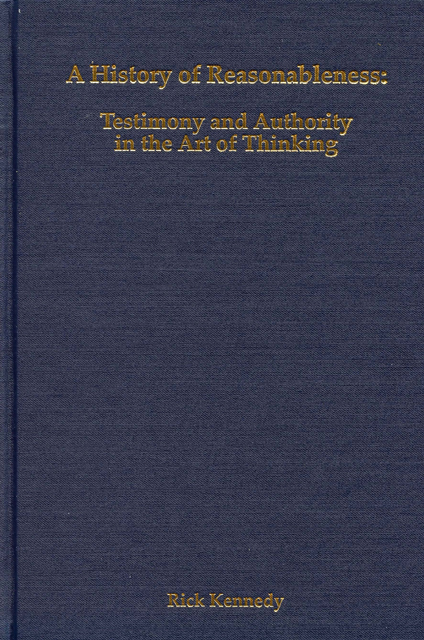Book contents
- Frontmatter
- Dedication
- Contents
- List of Figures
- Acknowledgments
- Introduction: The King of Siam and Assent to the Existence of Ice
- One The Classical Tradition of Testimony in Topics
- Two Three Medieval Traditions: Augustine, Boethius, and Cassiodorus
- Three Two Renaissance Traditions: Ciceronian and Augustinian
- Four The Long Influence of The Port-Royal Logic
- Five Appreciating Aristotle: Thomists, Scots, and Oxford Noetics
- Six Testimony Becomes Experience: The Rise of Critical Thinking
- Bibliography
- Index
One - The Classical Tradition of Testimony in Topics
Published online by Cambridge University Press: 17 March 2023
- Frontmatter
- Dedication
- Contents
- List of Figures
- Acknowledgments
- Introduction: The King of Siam and Assent to the Existence of Ice
- One The Classical Tradition of Testimony in Topics
- Two Three Medieval Traditions: Augustine, Boethius, and Cassiodorus
- Three Two Renaissance Traditions: Ciceronian and Augustinian
- Four The Long Influence of The Port-Royal Logic
- Five Appreciating Aristotle: Thomists, Scots, and Oxford Noetics
- Six Testimony Becomes Experience: The Rise of Critical Thinking
- Bibliography
- Index
Summary
Greek and Roman dialectic and rhetoric taught that the art of being reasonable and persuading people toward reasonable conclusions required an understanding of the relationship between what we know from within ourselves and what we learn from others. The former was our strongest knowledge—a boy mathematician could wield such knowledge with great force. The latter was weaker—wisdom and the experiences of long life were required for its best use. The former was individual, the latter was corporate. The former was solipsistic, the latter, forensic. For Aristotle and the classical liberal arts tradition that later developed, the disciplines of dialectic and rhetoric were responsible for teaching this relationship. Aristotle ingeniously created an intellectual device that served this and other purposes. He called it topics.
Topics was a schematic structure to be used mentally for analyzing, storing, and retrieving information. Organized in a triangular structure, the student entered it at the narrow top and descended through the structure adding to the breadth and depth base of the triangle as needed. Aristotelians for two thousand years explored this malleable structure, and at times let it dominate all of logic and epistemology, but more often hedged it in beside other Aristotelian categorization strategies. Sometimes it was described as a storehouse of all knowledge in which a student could be surrounded library-like with every bit of information in spacial relation to its related bits. Topics could help a person analyze and categorize knowledge. It could also help an orator preparing a persuasive argument gather diverse bits of evidence to support a larger point. At minimum it was supposed to help a person’s memory. The fundamental organizing principle of topics was epistemological, with the kinds of knowledge separated first according to their sources. At the entrance to the storehouse, the first division of everything to the left or to the right was a distinction between technical and nontechnical sources of knowledge. To the left was all the knowledge that was worked up personally within oneself. To the right was all the knowledge gained from outside sources, from authorities. The whole system of topics was driven by distinguishing information gained from within oneself and from various testifiers and authorities.
ARISTOTLE AND THE CREATION OF TOPICS
Diogenes Laertius wrote that Aristotle said that Zeno of Elea was the inventor of dialectic.
- Type
- Chapter
- Information
- A History of ReasonablenessTestimony and Authority in the Art of Thinking, pp. 9 - 42Publisher: Boydell & BrewerPrint publication year: 2004



